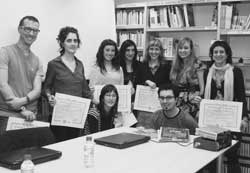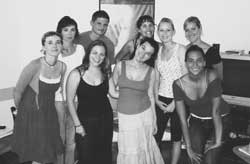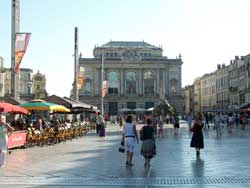
00
El jueves 12 de marzo tuvo lugar en la Sala de Recursos de la EOIP, el acto de entrega de las becas que la EOIP, en colaboración con la fundación CAN, otorga a los 10 mejores proyectos presentados por el alumnado en los diferentes idiomas.
Este año los alumnos, cuyos trabajos han obtenido las mejores puntuaciones, han sido:
GARBISU GOÑI, Sergio ............................ ALEMÁN
CARRALERO BIERZYÑSKA, Paula ....... FRANCÉS
GONZALEZ IRAIZOZ, Marta ..................... INGLÉS
INDAVE NAVARLAZ, Amaya .................... FRANCÉS
PINILLOS URRA, Nekane ......................... FRANCÉS
UHALTE ESTEBAN, Mirian ....................... INGLÉS
RUIZ-GAONA RODRIGO, Laura ...............ITALIANO
GANUZA QUEL, Aitziber ........................... ITALIANO
ARNAIZ TOMÉ, Ainhoa ............................. INGLÉS
GOROSQUIETA GUEMBE, Luis Xavier.....INGLÉS
El acto de entrega de las becas estuvo presidido por la dirección de la EOIP y el representante de la fundación CAN. Se contó con la asistencia de un nutrido grupo de alumnos.
Joachim Quandt, lingüista e investigador, oriundo de Alemania, impartió la conferencia: "Entiendes más de lo que tú crees”.
Es común escuchar entre alumnos de idiomas el comentario: "hablo mal el idioma".
Parece que cuanto más alto es nuestro nivel, más nos damos cuenta de todo lo que nos falta por aprender. A menudo es el hecho de centrarnos en palabras y estructuras desconocidas lo que nos lleva a no entender nada.
El ponente partiendo de la idea de que entendemos más de lo que creemos presentó técnicas sencillas que pueden ayudar a filtrar la información importante para la comprensión de un texto o una conversación en el idioma que estamos estudiando. Nos hizo ver que los nativos, con los que vamos a comunicarnos, pocas veces van adaptarse a nuestro nivel, los informativos no se van a leer de manera más lenta y las películas no siempre se pueden ver con subtítulos. Pero sí entendemos, si creemos en ello.
La charla dirigida a todo el alumnado de la escuela tuvo un gran éxito y fue muy aplaudida por todos los asistentes.

Before being given the grant, I had it very clear that I wanted to go to New York, because The Big Apple gives you the chance to combine your studies with sightseeing. Although I had never been there before, lots of the films and books I've seen and read are set there. This city is already part of our culture, and that's why it was so interesting for me to convert all these fictitious memories into reality.
I stayed there from 16th August to 1st of September. I arrived at JFK airport and I took the subway train to go from Queens to Manhattan. I remember that while going out from the subway station, the view of the city caught me. I was stunned watching that the largest buildings I had ever seen were around me and that one of the entrances to Central Park was on my right. During those two weeks I lodged in the West Side YMCA residence. My room was so tiny that I almost didn't have any place to move and I had to share the restrooms with other people, but these little inconveniences were nothing if we took into consideration where the residence was. I only had to walk 100 meters to get to Central Park. Inside this well-known park, there is a road full of people running, cycling and skating. This alley goes continously up and down across the park and because its many bends you can get lost easily. The road seems to have no end. The most incredible thing about Central Park is all the different things people can do there.
On 18th August, I started to go to my English school: Language Studies International. LSI New York is located in Downtown Manhattan, in Soho, close to Chinatown and near the Holland tunnel. New York's Chinatown is the most populous Chinese city outside China, and the Holland tunnel is the main way to join Manhattan to the mainland. As most students know, New York has five neighbourhoods -Manhattan, the Bronx, Queens, Brooklyn and Staten Island- and only the Bronx is located in the mainland. The others are islands, and people need to cross tunnels or bridges to get to mainland.
During our first day at school we did a test to measure each student's English level, and after that, two teachers interviewed us one by one to have an idea about our oral skills. I found it very accurate, and nobody complained about having been put in a wrong level. They took us a photograph, and they made us an ID card. The school was in the 11th and 12th floor, and every time I went up or down I had to show my ID card to the guard. That was a little bit boring.
During my first week, my teacher was Andy. I need few time to get used to his accent. He was from New Jersey, and I understood him almost all his words. He was a new teacher, and he explained to us that he already knew how difficult to study a foreign language was, because he had studied German. He lent me a book for two weeks, so I didn't have to buy any. I think that most of the exercises we did in class were very similar to those we do in the Language School in Pamplona: listenings, grammar, readings... However, my classmates' nationalities were different. They were from Japan, France and South Korea. I was surprised with the Japanese and Korean students, because, although their languages have nothing to do with English, they had a good pronunciation, much better than mine.
That situation took a turn for better during my second week. Since some of my classmates went back home and there weren't enough students in class, we were moved to another class. My new classmates were from Korea, Turkey, Italy, Japan, Spain...
My new teacher was Cindy Pack, a New Yorker. She was very concerned about the presidential elections, and every day she made some remarks about the politics in the United States: Irak's war, public health system, economy... By chance, the Democratic Party held a very important convention in Denver during that week. She also told us not to take into account tv series like Friends or Sex in the City, because most New Yorkers don't live like their characters. On the contrary, they usually live in very expensive and small flats, or in some cases, in tiny rooms in Manhattan. Although prices are very high, New Yorkers pay for the location: New York, and especially Manhattan, is the center of the world. It can offer people everything they want. That's what Cindy told us.
After my class, I had all the afternoon for me and I used to visit places, from the most famous, to others no so well-known. Of course, I went to the Statue of Liberty, but I also got to Staten Island in a free ferry. I crossed the East River on foot, and by subway train. I saw the skyline in daylight and at night. I visit the current New York Yankees stadium. I walked in Little Korea, Little Italy, Chinatown... You have so many places to visit in New York! But my best advice is that you should go there, and experience it.

Grazie alla bursa di studio della scuola ufficiale e della CAN, quest´ state sono stata a Roma, dall 20 luglio fino al due agosto. Non ci ero mai stata e ho scoperto una città FANTASTICA. (Siccome non è possibile raccontarvi tutto, ho scelto 10 parole per fare il riassunto).
FONTI. Roma è tutta piena di fonti dove l´acqua potabile scorre senza posa. Questo è bueno, perché non avrai mai sete, ma dal mio punto di vista, manca un po la coscienza ecologica. Credo che l´acqua sia un bene da risparmiare e ritengo che sia un lusso che non si debba scialacquare. Sarebbe sufficente mettere un rubinetto per aprire o chiudere secondo la neccesità.
ARTE. Se vi piace l´arte, non c´è dubbio, rimarrete a bocca aperta. Non si può scegliere soltanto un´opera. Chiese, piazze, archi, fontane, musei, palazzi, ville, gallerie, scalinate, pitture, sculture, giardini, porte, fori, ponti, mercati… ne hai un sacco! Possono essere d´ingresso libero o pagato, visite guidate o non, con o senza prenotazione, etc.
NEGOZI. Mamma mia! Tutta la città è piena dei negozi e non si può asttenere. Quelli che mi sono piaciuti in più sono vicini ai Campo dei Fiori. Avrei voluto comprare tante cose! È meravigliosa per fare shopping. Quando io sono stata erano i saldi di fine stagione, però i saldi non sono come qua, perché lì il percentuale dei prezzi ribassati non è lo stesso per tutte le merci. Rimarrei volontiera senza fermare!
TRAFFICO. Il traffico è veramente pazzesco (e questo non è un topico). All´inizio mi dava paura, poi mi sono "quasi" abituata. Tutto è pieno dei motorini e loro non rispettano i semafori. Questi diventano ambra rapidamente, ma dato che l’ ambra dura abbastanza la gente percorre ugualmente. Che follia!
AMABILE. Mi è sembrata una città amabile, affabile. La gente è abituata ad aiutare. Se qualcuno si perde, sia nel metro, sia nella strada, qualsiasi è pronto a dare aiuto amabilemente, persino a lasciare il suo dovere. (Mi è accaduto parecchie volte, perché non sono brava nell´uso della piantina). Quando sei in un bar è molto facile cominciare a parlare, malgrado non conoscere nessuno, la gente ti da retta.
SCUOLA. La scuola che ho scelto è la scuola Torre di Babele. È fondata nel 1984 e fa parte dell’ ASILS (Associazione Scuole d’ Italiano come Lingua Seconda), dell’ E.L.I.T.E. (European Federation of Associations for Teaching Mother Tongues to Foreign Students) e della rete di scuole europee TANDEM. Veramente posso dire que sia una "torre di Babele" perché c’ erano allievi di tutto il mondo. Ho conosciuto gente del Giappone, Israele, Inghilterra, Russia, Svizzera, Colombia, Germania, Austria, Polonia... Certamente tutti parlavamo l’ italiano. (Non dimenticherò mai, una serata nel Castel Sant’ Angelo prendendo una birra con una russa, altra giapponesse e una ragazza d’Israele, eravamo capaci di conversare abbastanza bene, nonostante ognuna avevamo un alfabeto diverso. Che esperienza!).
Ho fatto un corso intensivo di 4 ore al giorno. Dopo fare il test di livello (scritto ed orale) mi hanno assegnato nel livello 7 (C1) e le mie lezioni erano di mattina. La profesoressa, Barbara Grifoni, era brava e le lezioni erano divertente e non pesanti.
TRATTORIE. A Roma si mangia benissimo e si può mangiare con pochi soldi, se non scegliamo menù turistici! I quartieri di Trastevere, Testaccio, San Lorenzo, intorno a Piazza Campo di Fiori e piazza Navona offrono una grande scelta di trattorie oppure pizzerie. Vi raccomando La Montecarlo nella Via Alessandria e Mokarabia coffe bar nella Via Nomentana 123-127.
ITALIANO. Lo scopo era imparare e praticare l’ italiano. Quindici giorni è un periodo molto breve, però ho potuto verificare il mio livello, ascoltare, chiacchierare, correggere qualche errore, usare la lingua in un contesto reale ed avere contatto diretto con persone di madrelingua; in conseguenza dirò che sono soddisfatta della esperienza.
CALDO. Nella mia vita ho avuto mai tanto caldo. A mezzanotte era normale avere 26-28 ºC. Le mattine arrivavo a scuola in 15 minuti, ed il mezzogiorno mi occorrevano 30 minuti per fare lo stesso percorso.
ATTIVITÀ CULTURALI. Nella scuola c’ era anche un programma culturale molto interessante che ci permetteva fare amicizia fra gli studenti d’ altre livelli e, soprattutto, approfondire nella cultura italiana. Ecco le diverse attività organizzate dal 21 luglio al 1 agosto: Visita guidata al Colosseo e il Foro Romano, Serata in pizzeria, Seminario sul’ opera "Aida", Opera "Aida" alle terme di Caracalla, Cinema Garbatella all’aria aperta, Gita a Ostia Antica, Giornata al mare al Lido di Ostia, Film "Mediterraneo", Visita guidata a Villa Torlonia, Castel Sant’Angelo di notte, e Seminario di cucina. Roma, però è una gran città ed offre altre moltissime possibilità.

Je n´ai jamais eu de chance, parce que je n´ai jamais rien gagné. Quelle surprise a été la mienne l´année dernière quand j´ai gagné une des bourses de l´école de langues pour aller étudier le français en France. Au début, j´était très contente, parce que j´avais la possibilité d´étudier la langue dans son contexte naturel, c´est à dire, dans un lieu où on ne te comprend pas si tu ne parles pas la langue du pays. Cependant, cette enthousiasme s´est atténué car je devais préparér beaucoup de choses, et je n´avais pas de temps. C´est la raison pour laquelle guard juin est arrivé vite que je n´avais encore rien décidé ni préparé.
En juin, j´ai préparé tout très vite pour pouvoir faire mon séjour en France de la fin juillet à la fin août. J´ai cherché des informations sur Internet. Finalement, je me suis décidée pour une école à Montpellier, qui était l´école la meilleur marché que j´ai trouvée.
Je suis arrivée à Montpellier le 27 Juillet, un jour où il faisait très chaud. J´ai pris le tramway, en suivant les indications que l´école m´avait envoyées. Quand je suis arrivée a la résidence universitaire (type de location que j´avais choisi sur Internet) le concierge de la résidence ne trouvait pas ma chambre. Il disait qu´il n´avait pas de chambre disponible pour moi et qu´il ne connaissait pas mon école. J´était très surprise. Après 30 minutes d´attente, miraculeusement il a trouvé ma chambre. Elle était petite mais assez bien pour y rester un mois.
Le lundi matin, je suis allée à l´école pou faire un test de niveau. Hélas, le niveau que l´école avait choisi pour moi était très bas. C´est la raison pour laquelle je suis allée parler avec eux et ils m´ont changé de niveau. La professeur était très sympa et l´ambiance en classe formidable. Ses classes étaient très dynamiques et amusantes. J´avais toujours envie d´y aller. On faisait de la grammaire, du vocabulaire et aussi nous parlions beaucoup sur différents sujets.
L´école était petite mais très bien équipée et organisée. Il y avait une salle avec des ordinateurs pour que les élèves les utilisent pour parler avec leurs amis et leur famille, mais aussi pour étudier la langue. Il y avait aussi deux ateliers de conversations par semaine pour les différents niveaux, qui étaient totalement gratuits. De plus, l´école proposait un film par semaine en français avec des sous- titres. Les activités organisées par l´école étaient très chères mais cela te donnait des idées. J´ai donc décidé de faire la connaissance de la région du Languedoc avec mes amis mais tout en suivant les activités de l´école.
La région est magnifique. Elle a beaucoup d´histoire et elle se trouve à côté de la mer. On peut visiter Carcassonne, Narbonne, Nîmes, Avignon… mais on peut aussi aller simplement à la plage pour profiter de l´été qui est chaud là- bas.
Avec cette expérience en France j´ai appris beaucoup de choses, mais surtout, beaucoup sur la France et sa langue. J´avais besoin d´utiliser la langue tous les jours et dans tous les contextes. Je suis convaincue que ma chance a changé. Maintenant j´ai plus confiance en moi- même, parce que je suis consciente que je suis capable de me faire comprendre en français, une langue que je trouve très difficile à parler.
VALORACIÓN PERSONAL DEL CURSO
Esta experiencia me ha permitido adquirir más confianza en mí misma. He comprendido que soy capaz de desenvolverme en un ambiente totalmente francófono, sin depender de la ayuda de nadie. Este viaje me ha abierto los ojos: soy capaz de hablar francés y además, ¡se me entiende!
La valoración que hago del curso es totalmente positiva. Creo que tuve suerte con la elección de la escuela y de la profesora. Era una persona muy dinámica pero con la psicología suficiente para saber abordar a cada alumno. Además los compañeros y la gente que conocí eran todos estupendos y pasamos muy buenos momentos juntos.